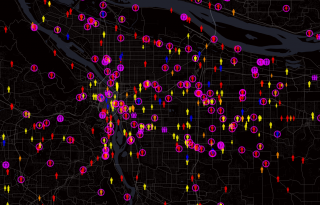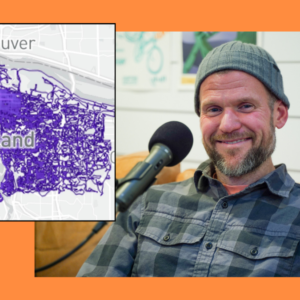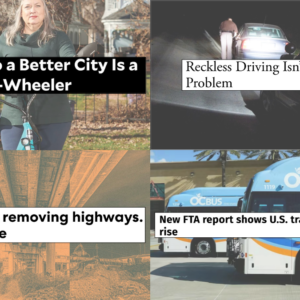
(Image: Metrocosm.com)
This week’s Monday Roundup is sponsored by Walnut, the Portland-based leather goods maker whose new Travel Dice set is perfect for taking along on your next bike tour.
Here are the bike-related links from around the world that caught our eyes this week:
Death map: A new online map shows 373,377 dots — one for every person who died in a motor vehicle crash in the United States from 2004 to 2013. You can filter for incidents related to alcohol, speeding and distracted driving.
#NoCarForMe: NPR’s hashtag campaign offers an impressive variety of offbeat and/or appealing ways to get around.
Framebuilding boom: London’s biking boom has led to a surge of small manufacturers, too. “The sport of cycling is recovering from decades of decline,” writes Bloomberg.
Fix-it guide: Park Tool has generously illustrated new online guide to maintaining your bike.
Bike mythbusting: No, your city is not too hilly to be bike-friendly. Or too hot. Or too snowy. Or too sprawling. Or too formal. Or too car-centric. Copenhagenize gathers its mythbusting counterexamples into one big post.
Streetcar tracks: The family of a man killed on San Francisco’s Market Street after his bike wheel apparently caught in a streetcar track as he tried to pass a bus are shocked and dubious that a rider as experienced as he could have made that error.
Jaywalking enforcement: Austin police say they’re “reviewing” an incident in which officers are filmed punching a man into submission after he reportedly jaywalked across a street that was closed to traffic. (If this sounds somehow familiar, it should.)
Helmet laws: A new study of Canadian provinces and regions found that helmet mandates have no correlation to bike-related hospitalization rates for brain, head, scalp, skull, face or neck injuries. Bike injury rates varied greatly but were predicted by two variables: being male made you much likelier to be hospitalized, and being in a city with more biking made you much less likely to be hospitalized.
Advertisement
Fear vs. biking: “The constant and overwhelming media message is simple,” writes Bicycle Retailer in the first of what seems to be a first-rate series about how to sell bikes in a culture of fear. “Every trip by bike is a potential trip to the graveyard.”
Deadliest interstates: Mile for mile, the most dangerous freeway in the country is Atlanta’s I-285 ring road, which saw 29 fatalities in 75 miles in 2013.
Justice podcast: Steph Routh, former director of Oregon Walks, just launched a new podcast about “justice and the built environment.” The first episode, an interview about Portland’s housing crisis, is co-hosted by her fellow bike lovers Alexis Gabriel and Mychal Tetteh.
Seattle levy: Seattle residents bucked conventional wisdom to approve a nine-year transportation property tax that includes funding for a neighborhood greenway network bigger than Portland’s, dedicated bus lanes around town and 50 miles of protected bike lanes.
Urbanist majority? “Maybe the NIMBYs are loud but smaller in number than we thought they were,” one union president who supports the city’s all-urbanist city council tells the Seattle Times.
Transgression photos: A New York bike commuter uses a camera on his front rack to capture hundreds of photos a month of people breaking laws with cars. “It’s not a happy experience,” he reflects.
If you come across a noteworthy story, send it in via email, Tweet @bikeportland, or whatever else and we’ll consider adding it to next Monday’s roundup.
— Michael Andersen, (503) 333-7824 – michael@bikeportland.org







Thanks for reading.
BikePortland has served this community with independent community journalism since 2005. We rely on subscriptions from readers like you to survive. Your financial support is vital in keeping this valuable resource alive and well.
Please subscribe today to strengthen and expand our work.
#Nocarforme – very inspiring.
I love seeing the different ways people enjoy getting around. I always find myself wondering why people aren’t on a “normal” bicycle when I see them using other modes. The obvious answer that I now realize-it’s not as fun for them!!!
Here in the south bay area we are mourning the loss of a fellow cyclist on a popular route with a very tricky intersection: http://www.mercurynews.com/ci_29064233/palo-alto-bicyclist-killed-page-mill-road
That Park Tool repair site looks awesome. I don’t care if it’s just a fancy way to advertise their tools…
On Tuesday’s ballot, they also passed a measure to publicly finance local campaigns.
Or maybe Seattle just weighed the costs against the benefits and decided that it was worth spending a little money to live in a city where roads are safer and driving is optional.
When I moved to Portland 16 years ago I was surprised at how libertarian and fiscally conservative this city was. I hope Portland can become more like Seattle in its governance and politics.
What? In what way(s) donyou want Portland to behave more like Seattle?
Regarding the copenhagenize mythbusting and hills, as a citizen of Seattle I find that the prevalence of hills makes actually makes it easier for me to get around; hills aren’t every ride, but when I do have to go up one (or several) it just improves my overall fitness for riding in any situation, so I do it more.
RE: death map
I wonder how they know whether or not speed is a factor in a fatal traffic accident. If they are relying purely on police reports, I would say speed is probably under-represented as a factor. I see too many crash reports that indicate ‘speed was not a factor’, when they are completely ignoring the basic speed rule and only looking at the posted speed limit.
Excellent point.
Like Frank Bohannon killing Kerry Kunsman – no, speed was not a factor What a joke that was. Or Marvin Ford killing Hank Bersani.
Compare Chicago, nearly all of them report speed as a factor.
Speed is always a factor. A Stopped car hits no one, so at what point does it cause a crash? Speed limit? 10 over? Just the people who run off the road doing 100?
It is easy to cite speed as a factor, and its easy to do speed traps. I’m always worried that speed enforcement can take away from less obvious and harder to cite risk factors.
They got the data from FARS
http://www.nhtsa.gov/FARS
RE: fear vs. biking
From what I understand, cities that have more cyclists have fewer crashes and other conflicts with motorized vehicles. Seems logical – the more you see something, the more you expect to see it and therefore you modify your behavior to accommodate it.
So when I see headlines implying that cycling is inherently dangerous and cyclists are crazy risk takers, it seems counterproductive to positively raising awareness of cyclists on the roads. I am not at all saying we should ignore fatalities or crashes – those need to be surfaced to raise awareness too, but these should not become the primary face of cycling.
The way cycling is portrayed in popular media should be taken with a huge bag of salt, but unfortunately most people don’t realize that. I’ve heard too many comments from friends and family members about how I am taking my life in my hands and how they worry about me. I used to appreciate the concern, but now it just annoys me. Any opportunity to correct the portrayal of bike commuting is up to us, the regular people of the world who ride our bikes to work and school every day, year after year.
Same here. When I leave school and someone says, “Ride safe,” I reply with “Thanks, drive safe.” I have much less fear for my safety riding than I do driving on Hwy 26.
Bingo–post of the week, right here!
Nicely written, and so true. Many comments on the articles I mentioned about Jeff Donnelly who was killed crossing two lanes of 50 MPH traffic to get to a left-side bike lane are testament to this, and in one response I point out that safety for drivers is not actually that different from bicyclists (see the book “Pedaling Revolution” by Jeff Mapes).
Yesterday it rained here in the bay area, which is significant because 1) it hasn’t rained much in years, so the roads got slick, and 2) drivers here don’t fare so well in the rain. Returning from a training ride (race bike, team kit, etc) I was chatting with a fellow cyclist (street clothes, no helmet, urban commuter) about the weather, and as he pulled away I instinctively said “Be careful out there.” I had just seen a few cars fishtail or skid, and watched one guy nearly hit a jogger while skidding into an intersection on his red. After I said it, I remembered that I had mostly reprogrammed myself from saying “have a safe ride” to “have a nice ride” to others… but maybe I still need a little work.
Another anecdote from yesterday: my wife worked in the ER and had a woman come in who said she was rear-ended while driving 75 MPH on the highway (65 MPH zones here). She was irate at how irresponsible the other driver was for speeding and driving inattentively. As her husband (sitting next to her) was meanwhile texting on his smartphone, my wife replied to them both, “Yes, I’m a bicycle commuter, and every day I see how much people speed and are addicted to their mobile phones.”
I read online yesterday a few of the articles about the many car crashes (including a few deaths) that occurred on our local highways because of the rain, but I saw not a single comment about how dangerous it is or how drivers are taking their lives into their own hands.
Sad truth is, that the perception of riding a bicycle as unsafe is completely unjustified. The stats are rigged, if you look at FARS or WISQUARS it’s always in, or near – the top 20 fatality stats. However – if you break down all the categories to the sub categories it’s something like the 75th on the list – and many of those in the top 10 are illnesses which riding bicycles will help prevent. You’re more likely to be shot or unintentionally poisoned, more likely to kill yourself intentionally and unintentionally. Ladders, bathtubs/showers, eating, drinking alcohol, simply tripping – all much more dangerous than riding a bicycle.
As I see it, the bike industry and some of the (usually professional) advocates have a stake in keeping the perception alive and well. Which do you think the bicycle companies (manufacturers and retailers) make the most money off of, a new bicycle with above average components at $1000.00 – Or -a piece of molded plastic layered with foam with a couple straps attached to for $75+? Disposable construction Day-glo vest at $30? Slightly modified LED flashlights at $50+. Let’s not talk of the whole field of transportation engineers, of course they don’t have any interest in pitching the idea of “safety” to their projects – when even with the best infrastructure- the improvements to “safety” are marginal at best.
The whole industry and advocacy movement are nearly schizophrenic in their messaging – on one hand “they” talk of wanting to increase ridership while at the same time constantly whining on how unsafe it is – often in the same sentence.
Part of the problem lays within the fact that as an industry (this ties into another article from above) is that the bicycle has always been boom and bust. The big companies need something to drive sales and keep the money coming in, because on whole the bicycle is one of the most durable products in existence – and it’s quite possible to ride one bicycle your entire life.
Check this out:
http://www.bicycleretailer.com/industry-news/2015/11/04/rick-vosper-haunted-ghosts-dead-cyclists
Doh! Sorry, I missed it here but got it from Richard M’s site; thought I was broadening horizons.
To be fair, it’s hard to ‘advocate for safety’ while downplaying the dangers. It’s a delicate balance, especially when challenged by the perception that driving is so safe, because that’s such a primary selling point that the American public gets bombarded by TV with daily (well, nightly – especially since news broadcasts seem so overwhelmingly sponsored by cars).
There is a difference between advocating for safety and advocating for bicycles – which is kind of my point.
The idea that the two walk along hand in hand isn’t the case. Safety advocates don’t try to change the misguided presumption that riding a bicycle is safe – they cave into it and work with it – and in effect strengthen the “riding a bicycle isn’t safe” mythology.
The bicycle advocate would work towards attempting to change those false presumptions. And at times they must stand up and counter the safety advocates when their presumptions run counter to the argument that riding a bicycle isn’t safe – because it is – it’s safer than riding in a passenger car and safer than walking.
Or that wearing high-viz clothing is the natural thing to do if you’re not in a car.
gb,
The perception that every bike ride is a potential trip to the graveyard is true. Of course that is also the case with each walk or car ride as well. Bikes ARE dangerous particularly if you ride in traffic. Most of the time you’ll make it OK, but the danger is very real as the real statistics show.
In this life, only 2 things are guaranteed: death and taxes.
What happened in San Francisco is unfortunate but the victim’s mother is in denial. I hate to quote “The Rules” but #64 comes to mind: “…confidence increases with time and experience. This pattern continues until it falls sharply and suddenly.”
Nobody wants to get taken down by the tracks—nobody wants to grow old, either. If you don’t like or believe these things, try the alternative on for size. Personally, I hope to keep on riding into old age, but we are mortal and fallible.
Fear vs. biking: BikePortland certainly fits that media profile
New invention eliminates harmful exhaust from cars. I have no idea if this is BS or not. Until it goes commercial, it doesn’t matter:
http://www.prnewswire.com/news-releases/breakthrough-co2-technology-eliminates-vehicle-exhaust-fumes-at-the-source-300149468.html
If it is true, this device will be the end of the climate change debate since this device will eliminate CO2 emissions.
I love the use of the word “talisman” to refer to a bike helmet in the Bike Retailer article. Pretty well sums it up. I need to make a helmet sticker with that on it.
(Although to get picky, the word “amulet” is more accurate.)